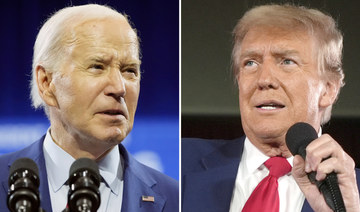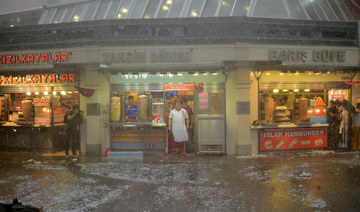Who would not be attracted by the hope of “Prosperity For All”? It is clear from the very beginning of this book that it is written for “anyone with a basic knowledge of economics,” although in the hope that it will also appeal to the general public.
As author Roger Farmer, professor of economics at the University of California, Los Angeles (UCLA) and co-editor of the International Journal of Economic Theory, writes: “This book is an unashamed attempt written in simple language to persuade both academic and nonacademic readers alike why economics must change and how to change it.”
He is not the only one. A group of economics students in 2012 founded the Post-Crash Economics Society at the University of Manchester. The students believe that the content of the economic syllabus and teaching methods should be seriously rethought. After the failure of economic experts to explain and foresee the economic crisis of 2008 and to present an adequate remedy, students are also looking for economic teachings that are more relevant to the world and that deal with financial crises.
‘Prosperity For All’
In this newly published book, Farmer surfs the wave of change. Unafraid of the bold challenge, he wants to fix macroeconomic theory and design a new financial policy “that stabilizes financial markets and guarantees prosperity for all.”
Farmer acknowledges that unregulated free markets can trigger higher rates of unemployment that are unacceptable.
“Government has a responsibility not just to maintain a low and stable inflation rate and to stabilize output fluctuations in the short run, but also to maintain full employment in the long run,” he writes.
Everyone is entitled to a job, but finding one is tied to the state of the market. When market participants regain confidence, they are ready to pay more for assets. When demand picks up, companies start hiring more people to supply the growing demand. Consequently, companies make more money and unemployment falls. Optimism breeds optimism or, as Farmer puts it, “when we feel rich, we are rich.”
A new distribution mechanism
He believes that during a depression, when the interest rate is zero, we should try anything and everything to restore the aggregate demand, which is measured by the sum of spending by households, businesses and the government. The aggregate demand is the biggest driving force in the economy.
“My own preferred policy would be to send a check for $1,000 to every domestic resident, paid for by printing money. That distribution mechanism puts cash in the hands of those people who know best how to spend it: You and me. But, taking a corrective fiscal action after a depression has occurred is like closing the barn door after a horse has bolted. It would be much better to design a policy that prevents a depression from starting in the first place through active treasury trades in the asset markets,” writes Farmer.
However, one of Farmer’s most pertinent proposals is that the central bank should intervene on a monthly basis in the financial markets by buying or selling shares in an exchange-traded fund (ETF) in the stock market in order to regulate the unemployment rate.
The author’s arguments are often difficult to follow for a neophyte, especially when they involve differences between pre-Keynesian ideas held by classical economists and New Keynesians who are re-interpreting such theories.
Jo Earle, a founder of the Post-Crash Economics Society, describes mainstream economics as “well defined mechanical relationships between different moving parts, connected by metaphorical pipes, cogs and levers: Interest rates go down, bank lending goes up, taxes go down, investment goes up.”
Economists often rely on mathematical models to help them to understand how markets work, how individuals make decisions and how markets and people interact to create outcomes that shape society. However, economic models cannot predict how a future model of gravity will calculate an object’s velocity.
Farmer concludes that confidence and belief drive economic activity, while fear stops people from investing and trading. He believes that the only way to prevent market fluctuations is “to design an institution, modeled on the modern central bank… Let us hope the adoption of a new financial policy that can prevent and/or mitigate the effects of financial crises on persistent and long-term unemployment will be a much swifter process than the 350 years it took to develop the modern central bank.”
Despite its general appeal, “Prosperity For All” is neither for the faint hearted nor for anyone without a basic knowledge of economics.
Farmer’s narrative is most clear when he speaks a language that ordinary people can understand but he is at his best when he challenges conventional macroeconomics and presents his ingenious monetary model. This book will certainly spark a debate that policymakers, academics and informed citizens cannot ignore.
Book review: Economic sense for all?
Book review: Economic sense for all?
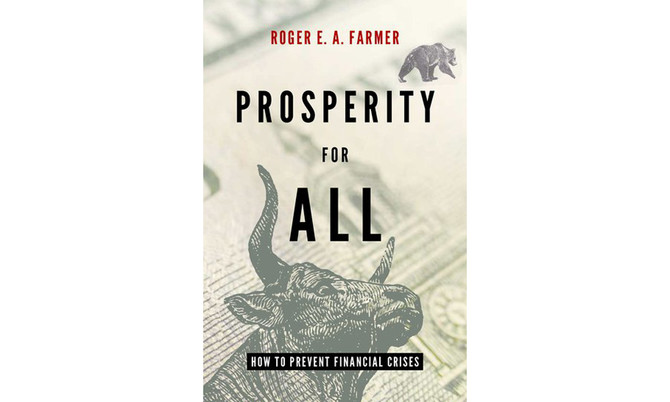
Miniature poodle Sage fetches top prize at Westminster Kennel Club Dog Show

- Sage, a 4-year-old black-colored female groomed in the fine, fluffy topiary style traditional for poodles, competed head to head against the winners in six other groups
- The Westminster dog show bills itself as the second-oldest US sporting event, behind only the Kentucky Derby thoroughbred horse race
NEW YORK: A sprightly miniature poodle named Sage was crowned “Best in Show” on Tuesday at the 148th annual Westminster Kennel Club Dog Show, winning the grand prize in the most prestigious competition among pure-bred canines in the United States.
Sage, the finalist representing 21 breeds classified as non-sporting dogs, triumphed over more than 2,500 top-ranked dogs competing in the two-day contest, held at the USTA Billie Jean King National Tennis Center in the Queens borough of New York City.
Sage, a 4-year-old black-colored female groomed in the fine, fluffy topiary style traditional for poodles, competed head to head against the winners in six other groups — terriers, hounds, herding dogs, working dogs, sporting dogs and toy dogs.
She was the first female to win the top prize at Westminster since 2020, according to commentators on the Fox Sports channel, which broadcast the event live.
And she became the fourth miniature poodle to claim the top prize in the 148-year history of the contest, with the trophy previously going to her breed in 1943, 1959 and 2002, according to kennel club records.
The larger “standard” poodle breed has been declared Best in Show five times, most recently in 2020, and the smaller “toy” poodle breed has won twice.
The poodle originated as a hunting dog in Germany and is now recognized as the national dog of France.
Sage’s handler, Kaz Hosaka, cried tears of joy and carried his prized poodle in his arms around floor of the auditorium to cheers of the crowd as he celebrated what he said was his 45th year participating at the Westminster dog show and the last of his career.
The Westminster dog show bills itself as the second-oldest US sporting event, behind only the Kentucky Derby thoroughbred horse race. This year’s competition drew a field of contenders representing 200 breeds from all 50 US states and 12 other countries.
Mercedes, a female 4-year-old German shepherd, was named runner-up for the overall contest, after first winning the top prize in the herding dog group.
Along with Sage and Mercedes, the two other finalists chosen on Monday were Comet the Shih Tzu, representing the toy group, and Louis, the Afghan hound leading the hound group.
Rounding out the finalists were three group winners chosen on Tuesday — Micah the black cocker spaniel, representing sporting dogs; Monty, the giant schnauzer, leading the working dogs; and Frankie, a colored bull terrier from the terrier group.
‘Miracle’ survivor found 5 days after building collapse

- When we went down to the side of the slab we had uncovered, we heard somebody inside, and we stopped all the heavy operations
JOHANNESBURG: Rescuers and onlookers cheered and applauded on Saturday as a survivor was rescued after 116 hours from underneath the rubble of a collapsed building in South Africa, with the tragedy having killed at least 13.
Provincial premier Alan Winde said on X: “It is a miracle that we have all been hoping for.”
An apartment block under construction in the southern city of George crumbled on Monday afternoon while an 81-person crew was on site.
“When we went down to the side of the slab we had uncovered, we heard somebody inside, and we stopped all the heavy operations,” Colin Deiner, head of rescue operations, told reporters.
Rescuers then called out to the survivor, and he spoke back, Deiner said.
“He indicated to us that he’s got weight on his legs, and we’re very concerned about that after such a long period.” After several hours, the survivor was extricated and rushed to a hospital.
Rescue teams have been working against time since the structure came crashing down.
Twenty-nine people were rescued alive, while thirty-nine remained unaccounted for.
Winde said a “difficult” identification process was underway, and police were using fingerprints, DNA testing, and photographs.
The city had approved construction plans for a 42-unit apartment block in July.
The reasons for the collapse are still unknown.
Biden jokes Trump should have injected himself with bleach

- Biden also made light of Trump’s “love letters” from North Korean leader Kim Jong Un
- In a senior moment, Biden mistakenly referred to Kim as the president of South Korea
PORTOLA VALLEY, California: US President Joe Biden joked on Friday that he wished former President Donald Trump had injected himself with a little bleach, resurrecting one of Trump’s more head-scratching moments from the early days of the coronavirus pandemic.
Biden, at a fundraising event south of San Francisco for his re-election campaign, said the presidency of his Republican opponent was chaotic and that voters should keep that in mind. Biden and Trump are locked in a close contest ahead of the November election.
“Remember him saying the best thing to do is just inject a little bleach in your arm? That’s what he said. And he meant it. I wish he had done a little bit himself,” Biden said.
During the early months of the pandemic in 2020, Trump said that an “injection inside” the human body with a disinfectant like bleach or isopropyl alcohol could help protect against the virus.
Biden also made light of what he called Trump’s “love letters” from North Korean leader Kim Jong Un, although Biden mistakenly referred to Kim as the president of South Korea.
Trump had met with Kim and exchanged a number of letters with him, copies of which he kept in a loose-leaf binder in the Oval Office.
A spokesperson for the Trump campaign did not immediately respond to a request for comment on Biden’s remarks.
Biden has made light of Trump’s bleach comment before, saying on April 24 in Washington that Trump had injected himself and “it all went to his hair.”
Meaty issue: German political party calls for €4.90 price cap on doner kebabs
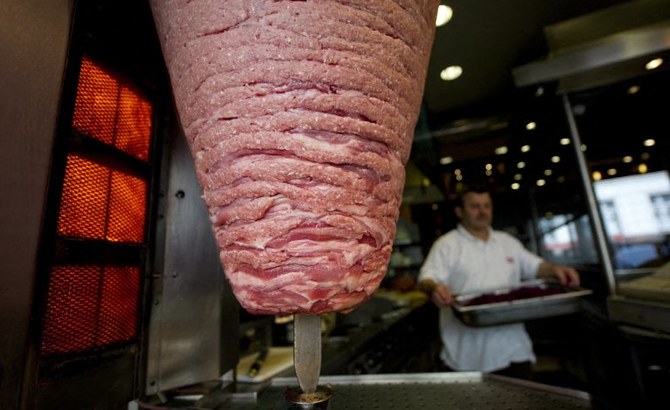
- Die Linke appeals to government as price of national favorite hits €10 in some cities
- Scheme would cost taxpayer about €4bn
LONDON: German political party Die Linke has urged the government to cap the price of a much loved food item — the doner kebab.
The party has proposed providing daily vouchers to households that would limit prices to €4.90 ($5.28) and €2.90 for young people under an initiative known as Donerpreisbremse.
The scheme is projected to cost the government about €4 billion.
Introduced after the Second World War by Turkish immigrants who adapted the dish to suit local tastes, the doner kebab is a national favorite in Germany, with an estimated 1.3 billion consumed annually. But their soaring price has become a hot-button political issue.
Die Linke said the cost of a doner kebab had reached €10 in some cities, from €4 just two years ago.
“For young people right now it is an issue as important as where they will move when they leave home,” said Hanna Steinmuller, a lawmaker with the Greens party.
“I know it’s not an everyday issue for many people here … but I think as voter representatives we are obliged to highlight these different perspectives.”
German Chancellor Olaf Scholz was famously confronted by a voter last year who demanded he “speak with Putin … I’m paying €8 for a doner.”
With public pressure mounting, Scholz recently acknowledged on social media that “everywhere I go, mostly by young people, I get asked if there should be a price cap for doner kebabs.”
Despite the appeals, the chancellor rejected the proposal, citing the impracticality of price controls in a free market economy.
Despite its humble origins as a street food, the doner kebab has become an unexpected point of political focus.
Last month, German President Frank-Walter Steinmeier sparked controversy when on a visit to Turkiye he gifted 60 kg of kebab meat from Berlin to Istanbul in what some called a clumsy attempt to symbolize the strong cultural ties between the two nations.
A 98-year-old in Ukraine walked miles to safety from Russians, with slippers and a cane
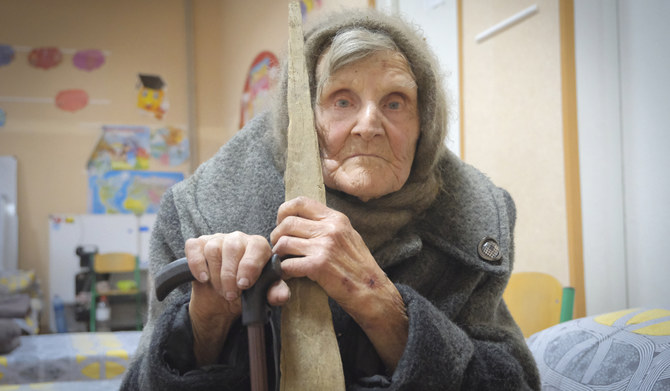
- Describing her journey, the nonagenarian said she had fallen twice and was forced to stop to rest at some points, even sleeping along the way before waking up and continuing her journey
KYIV, Ukraine: A 98-year-old woman in Ukraine who escaped Russian-occupied territory by walking almost 10 kilometers (6 miles) alone, wearing a pair of slippers and supported by a cane has been reunited with her family days after they were separated while fleeing to safety.
Lidia Stepanivna Lomikovska and her family decided to leave the frontline town of Ocheretyne, in the eastern Donetsk region, last week after Russian troops entered it and fighting intensified.
Russians have been advancing in the area, pounding Kyiv’s depleted, ammunition-deprived forces with artillery, drones and bombs.
“I woke up surrounded by shooting all around — so scary,” Lomikovska said in a video interview posted by the National Police of Donetsk region.
In the chaos of the departure, Lomikovska became separated from her son and two daughters-in-law, including one, Olha Lomikovska, injured by shrapnel days earlier. The younger family members took to back routes, but Lydia wanted to stay on the main road.
With a cane in one hand and steadying herself using a splintered piece of wood in the other, the pensioner walked all day without food and water to reach Ukrainian lines.
Describing her journey, the nonagenarian said she had fallen twice and was forced to stop to rest at some points, even sleeping along the way before waking up and continuing her journey.
“Once I lost balance and fell into weeds. I fell asleep … a little, and continued walking. And then, for the second time, again, I fell. But then I got up and thought to myself: “I need to keep walking, bit by bit,’” Lomikovska said.
Pavlo Diachenko, acting spokesman for the National Police of Ukraine in the Donetsk region, said Lomikovska was saved when Ukrainian soldiers spotted her walking along the road in the evening. They handed her over to the “White Angels,” a police group that evacuates citizens living on the front line, who then took her to a shelter for evacuees and contacted her relatives.
“I survived that war,’ she said referring to World War II. “I had to go through this war too, and in the end, I am left with nothing.
“That war wasn’t like this one. I saw that war. Not a single house burned down. But now – everything is on fire,” she said to her rescuer.
In the latest twist to the story, the chief executive of one of Ukraine’s largest banks announced on his Telegram channel Tuesday that the bank would purchase a house for the pensioner.
“Monobank will buy Lydia Stepanivna a house and she will surely live in it until the moment when this abomination disappears from our land,” Oleh Horokhovskyi said.






